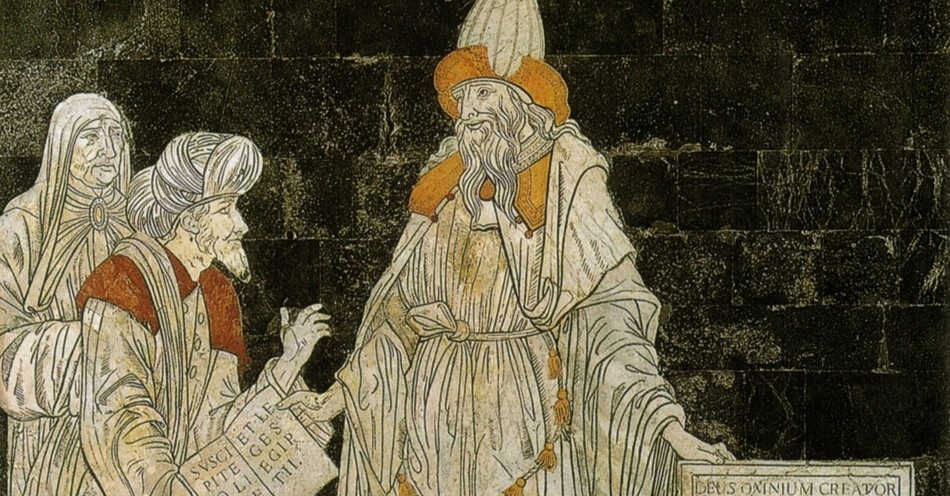Hermeticism may be one of the most influential sources for alternate spiritual worldviews. Yet so much about it is shrouded in mystery. So, what do we know about it?
What Are Hermeticism’s Key Beliefs?
Hermetic thought is primarily based on a collection of ancient texts known as the Corpus Hermeticum, which teach:
- Everything in the cosmos is interconnected and reflects each other, “as above, so below” (for example, a belief that the human body is the universe’s design in microcosm)
- There is a divine force, “the All,” that animates all created things
- There is a unifying theology underlying all religion (prisca theologia), lost since ancient times, that wise people can retrieve
- People find salvation by contemplating the divine source
Hermetic groups often at least imply that only a few can find enlightenment. As Christopher Auffarth puts it, Hermeticism is “the oldest religion as wisdom for the few.”
What Does Hermeticism Come From?
The Corpus and other key Hermetic texts are attributed to Hermes Trismegistos (“Thrice-Great Hermes”). Mark A. Waddel explains that Renaissance scholars believed he was an Egyptian magician who lived in the same period as Moses. Most historians today agree that he is a legendary figure combining attributes of the Greco-Roman god Hermes and the Egyptian god Thoth.
Current scholarship indicates that the Corpus was written in the late ancient period (100-300 AD), and earlier Hermetic documents were written sometime after 300 BC. This means that all the Hermetic texts were written during the Hellenistic period—when the Greeks (and later the Romans) ruled Egypt. The period explains why Hermes Trismegistos has attributes from Greek and Egyptian figures. The documents were written after the Greeks had conquered Egypt, adding their culture to Egypt.
Some early medieval authors mention early Hermetic writings—for example, Augustine critiques the Asclepius in his book The City of God. However, the key moment when Hermetic writings became popular in the West came in 1460. A monk, Leonardo da Pistoia, found a copy of 14 treatises from the Corpus in Macedonia and brought it to Italy. Marisilio Ficino was hired to translate it, and he quickly became an advocate for its ideas.
Hermeticism became very popular over the next two centuries. It influenced thinkers like Paracelsus (“The Luther of Medicine”), mathematician John Dee (Elizabeth I’s unofficial advisor), and scientist Isaac Newton. As will be discussed later, it became popular again during the twentieth century.
So, how does Hermeticism arise from these ancient texts?
What Separates Hermetism from Hermeticism?
Hermeticism sometimes gets used to cover two interconnected terms: Hermeticism and Hermetism. However, one is the core worldview; the other is an application.
Scholars typically use Hermetism to describe the philosophy in Hermetic texts, not magical rituals that apply it. Brian P. Copenhavor observes that the 17 treatises making up the Corpus mostly discuss “theological or, in some loose sense, philosophical issues: they reveal to man knowledge of the origins, nature and moral properties of divine, human and material being so that man can use this knowledge to save himself.” So, we see Hermetism in the Corpus, but not much Hermeticism.
Hermeticism is an application of Hermetism: astrology, alchemy, and other learned magical rituals that will allegedly give people enlightenment. Alchemy is key in many Hermetic practices because it can be understood as a spiritual process. In this view, alchemy isn’t just about finding a way to transform cheaper metals into gold: the soul must complete a purifying process to be transformed into something higher.
In the past, scholars like Jackson Spielvogel described Hermetism and Hermeticism as both appearing in the ancient texts. Copenhavor notes that while these writings don’t talk much about magic, they don’t seem to separate magic and philosophy.
However, newer scholars like Waddel or Antoine Faivre generally describe Hermeticism as a later development: something created when Renaissance thinkers interpreted the writings and developed magic rituals to realize its ideas. Whether these thinkers interpreted the Hermetic texts correctly is up for debate. Wouter J. Hanegraaff argues that there are substantial problems with Ficino’s Renaissance translation. Since the Hermetic texts leave room for creative interpretations, Hermeticists may not see this as a problem.
When Did the West Embrace Hermetic Thought?
Waddel explains that timing was key to Hermeticism becoming famous. Many scholars and artists tried to emulate and recover ancient culture during the Renaissance. Some took the craving to recover ancient ideas further, arguing that people could study the past and recover a higher knowledge Adam and Eve had in Eden. So, exploring Hermetic texts and trying to reconcile their ideas with Christianity was exciting.
Equally importantly, the way many people perceived magic had changed. Christian clergy had been discussing magic for centuries (for example, monks recording stories about witchcraft). However, many medieval Christians saw magic as either communicating with demons or a natural force that was part of creation. Magic, science, and religion intermingled.
Western Christians started to see science and religion as less connected during the Renaissance. As the way people organized science and religion shifted, a belief in “white magic” developed. White magic (or Renaissance magic, as some scholars call it) was seen as learned magic rituals communicating with divine spirits. The rituals could be part of studying what spiritual forces underlie creation by studying the natural world. Mixing Hermetic ideas with Christian ideas inside magic rituals fit people’s fascination with Renaissance magic.
While Hermeticism fit the trends, a key part of its appeal was the idea it was very ancient knowledge. Again, Ficino and others believed that Hermes Trismegistos was a real person who lived during the same period as Moses. Many people lost interest in Hermeticism after 1614, when Isaac Casaubon showed that the Corpus was written during the Hellenistic period, not Moses’ time.
While Hermeticism became less acceptable in Christian leadership circles, it influenced many secret groups.
How Does Hermeticism Affect Secret Societies?
Hermeticism continued as a minor philosophy for about three centuries. People regained interest in the eighteenth century as alternate spirituality groups became popular.
The period led to “the occult revival” from the 1880s to 1945. It included fringe Christian groups like Swedenborgianism and groups that combined Eastern religions with Hermetic ideas like Helena Blavatsky’s Theosophical Society. Freemasonry flourished during this period, with some lodges using Hermetic imagery. Even Hermetic groups not connected to Freemasonry used similar models to Freemason lodges: confidential rituals where members ascended membership tiers by mastering rituals or studying revered texts.
Like the Renaissance Hermeticists, the new Hermetic groups often combined Hermetic imagery with other systems—particularly the Kabbalah and alchemy. Rosicrucianism, a seventeenth-century philosophy also featuring alchemy, intermingled with Hermetic ideas in many secret societies.
The Hermetic Order of the Golden Dawn was the most famous Hermetic society, founded in 1883. It attracted many famous writers and artists, including poet William Butler Yeats and author Arthur Machen. The original group splintered in the early 1900s due to power struggles between various leaders. Golden Dawn initiate Aleister Crowley played a key part in these power struggles and later used many Golden Dawn images in his own religion, Thelema.
The occult revival ended after World War II, which Mark Morrison credits to the atomic bomb destroying occultists’ belief in never-ending spiritual progress. However, it set the foundation for modern occult and neopagan groups like Wicca. Hermeticism continues to be taught through groups like the Institute for Hermetic Studies and various Golden Dawn offshoots.
Does Hermeticism Fit Christian Beliefs?
As the earlier sections made clear, generations of Christian thinkers believed Hermeticism fit Christian beliefs. Newton, Ficino, and other Renaissance or Enlightenment thinkers believed that the prisca theologia was the same theology seen in the Bible. Waddel and others have noted common territory between Hermetic ideas and Christian theology—likely because the Corpus appears to have been influenced by early Christian teaching.
While there’s no harm in admitting Hermeticism has ideas in common with Christianity, that doesn’t mean it can fully reconcile with Christianity. Some of its ideas contradict historic Christian doctrine.
For example:
1. Hermeticism may not be pantheistic, but it makes God less personal (“The All,” a thing that is everywhere in all things) than Christianity. Christianity agrees that God is everywhere and created all things, but maintains he is also a person. He is God the Father, Son, and Holy Spirit, each relating to each other in the trinity.
2. Like Gnosticism, Hermeticism emphasizes knowledge (contemplating the divine source) as the key to escaping the known world and achieving a higher way of living. Christianity affirms that knowledge is important, but finding salvation is more than that: God became a material being, died, and was resurrected, and we are new creations in him. The gospel’s view of salvation involves mind and flesh being redeemed, not the right mental knowledge fixing everything.
3. Hermeticism suggests that all religions have a core true theology given by God to which people must return. Christianity affirms that all truth is God’s truth—meaning you can affirm an objectively true idea even if you find it in another religion. Certain strains of apologetics suggest this can be a way to build bridges with other religious communities. However, recognizing the truth in other religions does not mean all religions get everything right. Bits of truth appear in many places, but we only find the full truth in one place.
The final point may confuse Christians who are not used to the idea that there may be truth in other religions. A useful way to explain this is through J.R.R. Tolkien’s idea that Christianity is a “true myth.” In 1931, Tolkien spoke with his friends C.S. Lewis and Hugo Dyson. Lewis, not a Christian yet, suggested that myths are beautiful but lies. Tolkien argued that myths can have bits of truth that God implanted to point to something greater. For example, what if the reason many pagan religions have stories about dying gods who rise again is that one day this would happen? What if God placed this true idea in various religions to prepare people for Christ’s arrival? When Jesus came, died, and rose again, it fit all the mythic stories but with a difference: it actually happened. As Lewis wrote years later, it was a time when “myth became fact.”
The “true myth” idea affirms we can find elements of truth in other religions. We can even speculate that those elements were hints God put in cultures to point people in the right direction. However, Tolkien and Lewis understood that this doesn’t mean we can believe pagan myths and be saved. Believing in the Norse god Balder, who will rise again at Ragnarok, is not the same as believing in Jesus, who rose again on a Sunday morning in a Jerusalem cemetery. One is a story with hints of truth. The other is a historical fact that is the full truth, fulfilling everything the stories yearned for.
How Can We Relate to Hermeticists?
As with many alternate spiritualities, we may find it difficult to understand Hermeticists’ worldview. However, we are called as Christians to love others—even those who don’t share our views (Matthew 5:43-48). Whether trying to understand Hermeticists as friends, considering ways to dialogue with them about our faith, or wondering how to evangelize to them, we can do the following:
1. Consider what it gets right. As noted above, Hermeticism has some common ideas with Christianity. It affirms there is a spiritual world. It even cultivates a sense of wonder about the world because it is filled with the supernatural. Knowing that all truth is God’s truth, we can affirm as Christians that Hermeticism gets these and other ideas right while maintaining a different stance on other matters.
2. Remember that we have nothing to fear. We may have concerns about whether the spiritual forces Hermeticists report experiencing in rituals are something evil posing as something benign. However, we know that even if there are demonic forces involved, we have nothing to fear because God is greater than the forces of darkness (1 John 4:4).
3. Ask good questions. While debate has its place, it is rarely useful when talking with someone one-on-one about their faith. A far more effective, graceful tool is asking questions. What led Hermeticists to their beliefs? What conclusions do their beliefs lead them to believe about humanity, the planet, and other matters? Joshua D. Chatraw describes this approach as “telling a better story”—leading people to consider what story their worldview tells them and whether it is a good story. One of the gospel’s distinct features is that it is a good story—permeated with redemption, love, and wonder, fulfilling the larger good story the Bible had been telling for centuries. So, a good question we can encourage people to ask about their worldview is . . . what story is it telling?
Photo Credit: Picture of Hermes Tresmigistos by Giovanni di Stefano, Cathedral of Siena. Public domain image via Wikimedia Commons.
Christianity.com's editorial staff is a team of writers with a background in the Christian faith and writing experience. We work to create relevant, inspiring content for our audience and update timely articles as necessary.








